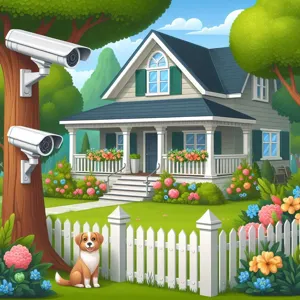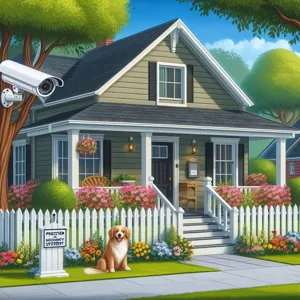In an increasingly unpredictable world, ensuring the safety and security of your home has never been more crucial.
With rising concerns about burglary and property crime, homeowners are seeking effective solutions that not only safeguard their possessions but also provide peace of mind for their families. Fortunately, enhancing your home’s security doesn’t have to be an overwhelming task. In this blog post, we will explore the top 10 practical strategies that can significantly bolster your home’s defenses, from high-tech security systems and smart home innovations to simple yet effective physical measures and community involvement. Whether you’re a seasoned homeowner looking to upgrade your security measures or a first-time buyer aiming to establish a safe haven, these actionable tips will empower you to take control of your home’s security today, ensuring that your sanctuary remains a safe and welcoming space for you and your loved ones.
1. Introduction: The Importance of Home Security

In an age where peace of mind is paramount, ensuring the safety and security of our homes has never been more crucial. The sanctuary we create within our four walls should be a refuge from the chaos of the outside world, a place where we can relax and feel protected. Unfortunately, the increasing rates of burglary and home invasions serve as a stark reminder that our homes can be vulnerable to unforeseen threats. This is where the importance of home security comes into play.
Home security is not just about physical barriers; it encompasses a holistic approach that includes technology, awareness, and community involvement. From state-of-the-art alarms and surveillance cameras to simple yet effective measures like proper lighting and neighborhood watch programs, a comprehensive security plan can significantly reduce the risk of intrusion. Moreover, enhancing your home’s security fosters a sense of safety for you and your loved ones, allowing you to enjoy your living space without constant worry.
Investing in home security is not merely a precaution; it’s an essential step towards safeguarding your family, belongings, and peace of mind. In this blog post, we will explore ten effective strategies that you can implement today to bolster your home’s defenses and create a more secure environment for everyone who enters. Whether you’re a homeowner or a renter, these practical tips will empower you to take proactive measures in protecting your haven. Let’s dive in!
2. Assessing Your Current Security Measures
Before implementing new security strategies, it’s crucial to evaluate your existing measures thoroughly. This assessment serves as the foundation for understanding where your home’s vulnerabilities lie and which areas require immediate attention. Start by walking around the exterior of your property, looking for potential weak points. Are there any low-hanging branches that could aid a burglar in climbing to a second-story window? Are your outdoor lights functional, or do they flicker ominously, casting shadows that could hide unwanted visitors?
Next, take a closer look at your entry points. check the condition of your doors and windows. Do they have sturdy locks, or are they old and easily compromised? Consider whether screen doors are equipped with secure closing mechanisms. Don’t overlook your garage and any side entrances; these are often the least monitored areas of a home.
Once you have a clear picture of your current security setup, list the strengths and weaknesses. For instance, if you have a state-of-the-art alarm system but no adequate outdoor lighting, that’s a red flag. Conversely, if your property is well-lit but lacks surveillance cameras, it might be time to invest in some cutting-edge technology.
In addition to physical assessments, consider your neighborhood’s crime rates and trends. Are there recent reports of break-ins in your area? Engaging with your neighbors can provide valuable insights into local threats that you might not be aware of, allowing you to adjust your security measures accordingly.
By thoroughly assessing your current security measures, you pave the way for targeted improvements that will significantly enhance the safety of your home. This process not only helps you identify specific areas for enhancement but also allows you to allocate your budget more effectively, ensuring that every dollar spent contributes to a more secure living environment.
3. Installing a Reliable Security System

When it comes to enhancing your home’s security, installing a reliable security system is one of the most effective strategies you can employ. A well-designed security system acts as both a deterrent to potential intruders and a safeguard for your peace of mind.
Modern security systems have come a long way from the traditional locks and alarms of the past. Today’s systems can include a combination of video surveillance, motion detectors, smart locks, and alarm monitoring services, all working together to create a comprehensive defense against threats. Imagine having the ability to monitor your home remotely through your smartphone; with advanced security systems, that capability is just a tap away.
When selecting a security system, consider opting for one that offers 24/7 professional monitoring. This means that if an alarm is triggered, trained personnel will contact you and local authorities immediately, ensuring a swift response even when you’re not home. Moreover, features like two-way audio in doorbell cameras allow you to communicate with visitors or potential intruders, adding an extra layer of security.
Not only do these systems provide protection, but many also offer smart home integration, allowing you to control everything from your lights to your thermostat remotely. This added convenience can create the illusion that someone is always home, further deterring would-be intruders.
In addition to the technological aspects, it’s crucial to ensure that your security system is installed correctly. Professional installation can maximize the effectiveness of your system, ensuring that all components are positioned for optimal coverage. Whether you choose a DIY approach or hire professionals, taking the time to set up your security system properly can significantly enhance your home’s safety.
Investing in a reliable security system is not just about safeguarding your physical belongings; it’s about nurturing a sense of security for you and your loved ones. By effectively implementing this strategy, you can create a fortified environment that protects against intrusions and gives you the freedom to enjoy your home without worry.
4. Enhancing Door and Window Security
When it comes to fortifying your home against potential intruders, enhancing door and window security should be at the forefront of your efforts. These entry points are often the first line of defense, and ensuring they are robust can significantly deter unwanted access.
Start with your doors. Invest in high-quality, solid core doors that resist forced entry better than standard hollow-core models. Consider installing deadbolt locks, which provide an extra layer of security beyond regular doorknob locks. Look for deadbolts that are made from hardened steel for added strength, and ensure they are installed properly, with the bolt extending at least one inch into the door frame.
Next, assess your door frames and hinges. Reinforce them with longer screws that penetrate deeper into the framing, making it harder for an intruder to kick in the door. Additionally, consider adding a security strike plate; these plates can withstand more force than standard ones, giving you peace of mind.
Now, let’s turn our attention to windows, which are often overlooked but equally vulnerable. Start by examining your window locks; ensure they are functioning correctly and replace any that appear flimsy or worn. Install window security film—this transparent layer can make glass harder to break, slowing down an intruder’s access and giving you more time to respond.
For an added layer of protection, consider installing window sensors or alarms that alert you to any unauthorized attempts to open or break a window. If you have sliding glass doors, add a security bar or a dowel in the track to prevent them from being forced open.
Finally, don’t underestimate the power of outdoor lighting. Motion-activated lights around your entry points can illuminate potential threats and deter intruders who prefer to operate in the shadows. Combining all these strategies will create a comprehensive security plan that not only protects your home but also gives you and your family peace of mind.
5. Utilizing Smart Home Technology

In an era where technology seamlessly integrates into our daily lives, utilizing smart home technology has emerged as a pivotal strategy for enhancing your home’s security. Imagine having the power to monitor your home from virtually anywhere in the world, all at your fingertips. Smart home devices are designed to provide peace of mind, convenience, and an additional layer of protection that traditional security systems often lack.
Start by investing in smart security cameras that offer real-time video feeds and motion detection alerts. These cameras can be accessed through your smartphone, allowing you to keep an eye on your property whether you’re at work, on vacation, or simply out for the evening. Many models even feature two-way audio, enabling you to communicate with visitors or deter potential intruders directly from your device.
Next, consider smart doorbells. These ingenious devices not only allow you to see who is at your door without having to open it, but they also provide a recording feature that captures any suspicious activity. This can be invaluable for both security and insurance purposes.
Moreover, smart locks are a game-changer for home security. With keyless entry systems, you can grant access to trusted individuals remotely, monitor entry times, and even set temporary codes for guests or service providers. This eliminates the risk of lost keys and grants you full control over who enters your home.
Integrating these devices into a cohesive smart home system can elevate your security measures even further. Smart alarms can work in conjunction with sensors that alert you to any unauthorized entry, while smart lighting systems can be programmed to mimic your daily routines, giving the illusion that someone is home even when you’re not.
Finally, don’t overlook the importance of a robust Wi-Fi network to support your smart devices. Ensure your network is secure with strong passwords and consider setting up a separate network for your smart devices to minimize vulnerabilities. By embracing smart home technology, you not only enhance your home’s security but also embrace the convenience of modern living, making your home a safer and smarter place for you and your loved ones.
6. The Role of Outdoor Lighting in Deterrence
When it comes to enhancing your home’s security, the role of outdoor lighting cannot be overstated. A well-lit exterior acts as a formidable deterrent against potential intruders, transforming your property into a less appealing target. Criminals are less likely to approach a home that is brightly illuminated, as shadows and darkness are often their allies, providing cover for their activities.
Strategically placing outdoor lighting around your property is key. Consider installing motion-sensor lights near entry points such as doors, garages, and pathways. These lights illuminate the area when they detect movement, startling would-be intruders and drawing attention to their presence. For added effectiveness, opt for bright LED bulbs that not only consume less energy but also provide clearer visibility.
Incorporating landscape lighting can also enhance your home’s security. By illuminating shrubs, trees, and other landscaping features, you eliminate hiding spots that intruders might exploit. Moreover, pathway lights can guide visitors safely to your door while simultaneously keeping an eye on any suspicious activity that may occur around your home.
Don’t forget about smart lighting options, which allow you to control your outdoor lights remotely. With smart technology, you can set schedules or turn lights on and off from your smartphone, giving the illusion that someone is home, even when you’re away. This proactive approach is particularly useful during vacations or extended absences, as it maintains a lived-in appearance.
In conclusion, outdoor lighting plays a pivotal role in enhancing your home’s security. By illuminating your property with intention and incorporating smart solutions, you not only create a welcoming environment but also significantly reduce the likelihood of a security breach. So, invest in your outdoor lighting today, and enjoy the dual benefits of safety and aesthetics.
7. Creating a Neighborhood Watch Program

Creating a Neighborhood Watch Program is one of the most proactive steps you can take to enhance your home’s security while fostering a sense of community among your neighbors. This collaborative approach not only helps deter crime but also cultivates a safer environment where everyone looks out for one another.
The first step in establishing a Neighborhood Watch is to rally your neighbors. Organize a meeting where residents can discuss their concerns and share their experiences regarding local security. This initial gathering is crucial for building trust and camaraderie among participants. During the meeting, you can outline the program’s goals, discuss the importance of communication, and explore various strategies for increasing neighborhood vigilance.
Once you have a core group of committed participants, assign roles and responsibilities. Designate a few enthusiastic members as coordinators who can help organize regular meetings, communicate updates, and maintain a neighborhood directory. This ensures that everyone stays informed about suspicious activities or security breaches.
Next, enhance the program’s visibility by creating eye-catching signs that indicate your neighborhood is part of a watch program. These signs serve as a deterrent to potential criminals who may think twice before targeting an area where residents are alert and engaged.
Regular communication is vital; consider establishing a group chat or email chain to share real-time updates about unusual occurrences or safety tips. This instant flow of information can make a significant difference in addressing concerns quickly and effectively. Additionally, organizing community events, such as safety workshops or social gatherings, can strengthen relationships and build trust within the neighborhood.
By creating a Neighborhood Watch Program, you not only empower your community members to take an active role in their safety but also create a support network that fosters lasting relationships. As neighbors look out for each other, the overall security of your neighborhood improves, making it a safer place to live for everyone involved.
8. Securing Your Garage and Outbuildings
When it comes to enhancing your home’s security, overlooking your garage and outbuildings can be a critical mistake. These areas are often viewed as secondary spaces, but they can provide easy access for intruders if not properly secured. Start by assessing the vulnerabilities of your garage: is the door sturdy? Are the windows reinforced? Upgrading to a heavy-duty garage door, equipped with a secure locking mechanism, is an essential first step. Consider installing a smart lock or a keypad entry system for added convenience and security.
Next, don’t neglect the windows. If your garage has them, ensure they are made of tempered glass or fitted with security film to deter break-ins. Adding motion-sensor lights outside can make a significant difference, illuminating any suspicious activity and acting as a deterrent.
For any outbuildings—such as sheds or workshops—apply similar security measures. Ensure that all entrances have high-quality locks. Reinforce doors with deadbolts and consider using security bars for extra protection. Installing a reliable alarm system that covers these areas can provide peace of mind, alerting you to any unauthorized access.
Additionally, keep valuable items out of sight. If your garage or shed houses expensive tools or equipment, try to store them in locked cabinets or within a secure, locked area. Lastly, don’t underestimate the power of surveillance; installing cameras focused on these access points can serve as both a deterrent and a way to monitor any activity. By paying attention to these often-overlooked areas, you can significantly bolster your home’s overall security and protect your valuable assets.
9. The Benefits of Reinforcing Your Home’s Perimeter
Reinforcing your home’s perimeter is a critical strategy for enhancing security that often goes overlooked. A strong perimeter creates a formidable barrier against intruders and serves as the first line of defense for your property. By investing time and resources into this aspect of your home security, you can significantly reduce the likelihood of a break-in while also providing peace of mind for you and your family.
Start by evaluating your current fencing and gates. A sturdy, well-maintained fence not only deters intruders but also delineates your property, making it clear where your space begins and ends. Opt for materials that are known for their strength, such as chain link, vinyl, or wrought iron. If possible, consider adding features like barbed wire or trellises with thorny plants to make climbing more difficult.
In addition to physical barriers, enhancing your perimeter can also involve strategic landscaping. Trim back overgrown bushes and trees that could serve as hiding spots for potential intruders. Instead, opt for low-maintenance, thorny shrubs at ground level that can act as a natural deterrent. Installing motion-sensor lights around your perimeter can illuminate dark areas, making it harder for anyone to approach unnoticed.
Don’t forget about gates; they should be just as robust as your fencing. Secure them with high-quality locks and consider adding an electronic entry system that allows you to monitor and control access to your home. An intercom system can also be added for added convenience and security, enabling communication with visitors without needing to open the door.
Lastly, consider integrating technology into your perimeter security. Smart cameras and security systems with real-time monitoring can provide alerts when unusual activity is detected, allowing you to respond swiftly. By taking these comprehensive steps to reinforce your home’s perimeter, you create an environment that not only protects your property but also fosters a greater sense of safety and well-being for everyone inside.
10. Educating Your Family on Security Protocols
Educating your family on security protocols is a crucial yet often overlooked aspect of enhancing your home’s safety. While installing advanced security systems and locks is essential, the human element of security can be just as significant. By fostering a culture of awareness and vigilance, every member of your household can contribute to a safer environment.
Start by discussing basic safety practices, such as locking doors and windows, even when at home. Make it a habit to check that all entry points are secure before going to bed or leaving the house. Encourage family members to be mindful of their surroundings, especially when returning home after dark. This includes being cautious about who is nearby and ensuring that no one is loitering around your property.
Furthermore, create a family emergency plan that outlines specific actions to take in the event of a security breach or emergency. This plan should include designated meeting spots, phone numbers of local authorities, and guidelines for safely communicating with each other. Regularly review and practice these protocols, so that everyone feels confident and prepared.
Additionally, consider holding discussions about the importance of internet safety, especially for children and teenagers who may be less aware of the risks associated with sharing personal information online. Teach them about the dangers of social media oversharing and how to recognize phishing scams that could compromise your household’s security.
Finally, foster an open dialogue about security concerns. Encourage family members to voice their thoughts on safety measures and share any unusual occurrences in the neighborhood. This collective awareness can help identify potential threats and ensure everyone feels empowered to contribute to the home’s safety.
By making security education a family priority, you not only bolster your home’s defenses but also create a sense of shared responsibility that can significantly enhance your overall security strategy. Remember, an informed family is a safe family, and together, you can make your home a fortress against potential threats.
11. Regular Maintenance and Updates of Security Systems
Regular maintenance and updates of your security systems are crucial for ensuring that your home remains a fortress against potential threats. Just like any other system in your home, security devices require consistent attention to function at their best. Over time, wear and tear can affect performance, rendering even the most sophisticated security measures ineffective if neglected.
Start by scheduling routine check-ups for your alarm systems, surveillance cameras, and smart home devices. Ensure that all components are in working order, batteries are replaced, and firmware updates are promptly applied. For instance, many modern security cameras have software updates that enhance their functionality or patch vulnerabilities; staying on top of these updates can significantly bolster your home’s defenses.
Additionally, consider conducting a thorough inspection of all entry points, such as doors and windows, to check for any wear or damage. Hinges can rust, locks can stick, and window seals can wear out, creating potential weak spots that intruders might exploit. By routinely assessing and maintaining these areas, you not only reinforce your security but also gain peace of mind knowing that your home is well-protected.
Incorporating these practices into your regular home maintenance routine will keep your security systems running smoothly and effectively. Remember, the goal is to create a proactive approach to security; a well-maintained system is your best ally in preventing potential break-ins and ensuring the safety of your loved ones and belongings.
12. The Importance of a Security Audit
A security audit is a crucial step in fortifying your home against potential threats. Much like a health check-up, a thorough security audit evaluates the effectiveness of your current security measures and identifies vulnerabilities that could be exploited by intruders. The importance of conducting a security audit cannot be overstated; it provides you with a comprehensive overview of your security landscape, allowing you to make informed decisions to enhance your home’s protection.
During a security audit, you’ll want to assess various aspects of your home’s security, from door and window locks to outdoor lighting and alarm systems. Start by examining entry points—are your doors solid and equipped with high-quality deadbolts? Are your windows fitted with secure locks? Don’t forget to evaluate your garage or any other access points that could be overlooked.
Next, consider the perimeter of your property. Are there any areas that are poorly lit or obscured by landscaping? Installing motion-sensor lights and trimming back overgrown bushes can eliminate potential hiding spots for would-be intruders. Additionally, if you have a fence, check for any gaps or weaknesses that could be easily breached.
A security audit also includes reviewing your technology. Are your surveillance cameras positioned effectively? Do they provide clear images and cover blind spots? If you rely on smart home devices, ensure they are updated and secured against cyber threats.
Finally, don’t overlook the human element. Are your family members aware of safety protocols? Conducting a security audit is not just about physical barriers; it’s about creating a culture of safety within your home. Engage your family in discussions about emergency procedures and encourage them to be vigilant.
By prioritizing a security audit, you are taking a proactive step towards safeguarding your home. It’s an investment in peace of mind, ensuring that you and your loved ones can feel secure in your own space. So, roll up your sleeves, take stock of your home’s vulnerabilities, and implement the necessary changes to bolster your security today.
13. Recognizing and Avoiding Common Security Threats
In the realm of home security, knowledge truly is power. Recognizing and avoiding common security threats is a crucial strategy to enhance your home’s safety. Each day, countless homeowners unknowingly fall prey to simple yet preventable risks that can compromise their security. By staying informed and proactive, you can safeguard your home and loved ones against potential threats.
One of the most prevalent threats comes from social media oversharing. While it’s tempting to post about your exciting vacation plans, doing so can inadvertently alert potential burglars that your home will be unoccupied. Instead, keep such information private and save the updates for when you return home, ensuring your residence remains under the radar during your absence.
Another common vulnerability lies in inadequate door and window security. Many homeowners overlook the importance of robust locks and security features. Investing in high-quality deadbolts, window locks, and security bars can significantly deter intruders. Additionally, simple measures like reinforcing sliding glass doors with dowel rods or upgrading to smart locks can enhance your home’s defenses.
Inadequate outdoor lighting is also a significant security risk. Dark corners and unlit entryways can create perfect hiding spots for intruders. Installing motion-activated lights around your property can illuminate these areas and deter unwanted visitors. Combine this with landscaping that does not obstruct visibility, and you’ll create an environment less inviting to potential threats.
Lastly, being vigilant about your surroundings can help you recognize suspicious activity before it escalates. Encourage family members to report anything unusual, and foster a sense of community by getting to know your neighbors. A connected neighborhood is a powerful deterrent to crime, as suspicious behavior is more likely to be noticed and reported.
By understanding and addressing these common security threats, you can create a fortified home environment that not only enhances your peace of mind but also protects what matters most. Remember, the key to effective home security is not just in the systems you install, but also in the awareness and preventative measures you take every day.
14. Conclusion: Taking Action for a Safer Home
As we reach the conclusion of our exploration into effective strategies for enhancing your home’s security, it’s clear that taking action is paramount. The safety and well-being of your loved ones and your belongings should never be left to chance. With the rise in crime rates and the ever-evolving tactics of intruders, it’s crucial to be proactive rather than reactive.
Implementing the strategies outlined in this blog post—whether it’s investing in robust locking systems, installing surveillance cameras, or simply improving your home’s lighting—can significantly reduce your risk of becoming a victim. Remember, even small changes can create a formidable line of defense against potential threats. Additionally, fostering a sense of community by getting to know your neighbors and participating in local watch programs can enhance security on a broader scale.
It’s important to approach home security as an ongoing process rather than a one-time fix. Regularly reassess your security measures, stay informed about new technologies, and adapt your strategy as needed. By taking these steps today, you’re not just safeguarding your property; you’re also investing in peace of mind for yourself and your family.
So, take a moment to evaluate your current security setup, identify areas for improvement, and make a plan to implement these strategies. Your home should be a sanctuary, and with the right actions, you can ensure it remains a safe haven for years to come.
In conclusion, enhancing your home’s security doesn’t have to be a daunting task; it can be an empowering journey toward peace of mind. By implementing the top 10 effective strategies we’ve outlined, you’ll not only fortify your home but also create a safer environment for you and your loved ones. From investing in smart technology to fostering community connections, each step contributes to a comprehensive security framework that adapts to your unique needs. Remember, security is an ongoing process, so stay vigilant and proactive. We encourage you to take action today, and share your own tips and experiences in the comments below—after all, a secure home is a happy home!






